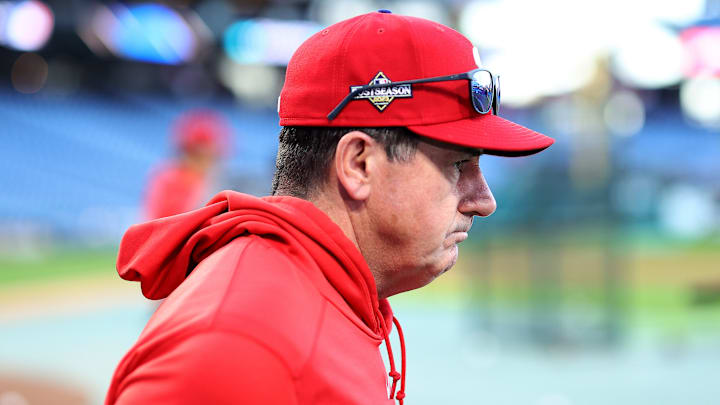Game 6: Leaving Aaron Nola in the game too long
In Game 6, when starter Aaron Nola showed early signs that he didn’t have his best stuff after giving up hard contact in the second inning, leading to three runs, many of the Phillies’ faithful believed that he shouldn’t have gone into the fifth inning to see the Diamondbacks’ order for a third time. They scored another run off of Nola before he finally exited the game.
In this situation, Thomson again shouldn’t get all the blame. The three runs Nola gave up in the second already happened, and he pitched two stronger innings following that frame. He just encountered his struggles once again in the fifth and yielded the fourth run to the Diamondbacks.
The Phillies couldn’t muster any offense, so even if Thomson had taken out Nola earlier, the only difference would be one less run on the scoreboard, which wouldn’t have made a difference in the end.
Game 7: Leaving Ranger Suárez in the game too long and not pinch-hitting Johan Rojas with the bases loaded
In Game 7, many thought starter Ranger Suárez was left in the game too long to see the Diamondbacks lineup a third time, just like Nola from Game 6. He ended up giving up the tying run before leaving the game at 2-2, while one of his inherited runners ended up scoring the Diamondbacks' game-winning run.
One has to recall that Suárez had been one of the Phillies' most dominant postseason pitchers to date. Added to the fact that he had only given up one run on five hits through four innings with no walks, five strikeouts and a low pitch count, he still had everything in control. It was just unfortunate that the Diamondbacks finally got to him. But remember there were already two outs when it happened, so with one pitch that could have gone his way, the whole game would have been different. So once again, Thomson shouldn’t get the blame for this one.
As for Johan Rojas, he came up to the plate with the bases loaded with two outs in the bottom of the fourth after the Phillies scored to go up 2-1 and had all the momentum.
With Rojas struggling to hit for most of the postseason, many thought that was the perfect time to bring in a pinch-hitter and put the game away. At the same time, no one on the Phillies bench could play defense at the level of Rojas, so if he was taken out that early in the game, it could potentially hurt them defensively later on. As a result, Thomson stuck with Rojas, and as most expected, Rojas struck out to end the rally.
So, for this one, Thomson should get part of the blame. As much as the Phillies needed to maintain solid defense, with their inability to put runs on the scoreboard during both Games 6 and 7, they needed to capitalize on that chance to put the game away with a big hit.
NEXT: The verdict! Plus, Thomson accepts the blame
